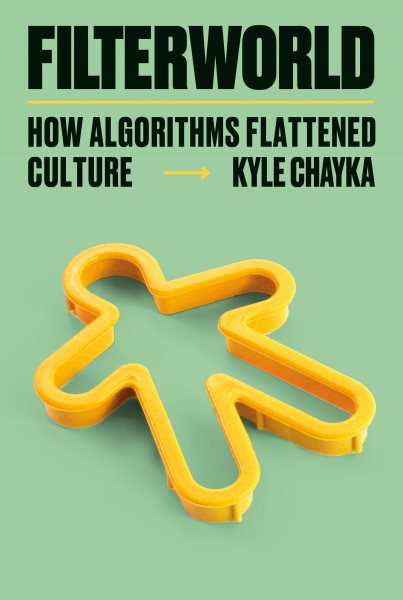
- This event has passed.
Kyle Chayka presenting “Filterworld: How Algorithms Flattened Culture” in conversation with OLIVER MUNDAY
January 19, 2024 @ 7:00 pm
| FREE
Harvard Book Store welcomes KYLE CHAYKA—staff writer for the New Yorker and author of The Longing for Less—for a discussion of his new book Filterworld: How Algorithms Flattened Culture. He will be joined in conversation by OLIVER MUNDAY—creative director of Doubleday and author of Don’t Sleep.
About Filterworld
From trendy restaurants to city grids, to TikTok and Netflix feeds the world round, algorithmic recommendations dictate our experiences and choices. The algorithm is present in the familiar neon signs and exposed brick of Internet cafes, be it in Nairobi or Portland, and the skeletal, modern furniture of Airbnbs in cities big and small. Over the last decade, this network of mathematically determined decisions has taken over, almost unnoticed—informing the songs we listen to, the friends with whom we stay in touch—as we’ve grown increasingly accustomed to our insipid new normal.
This ever-tightening web woven by algorithms is called “Filterworld.” Kyle Chayka shows us how online and offline spaces alike have been engineered for seamless consumption, becoming a source of pervasive anxiety in the process. Users of technology have been forced to contend with data-driven equations that try to anticipate their desires—and often get them wrong. What results is a state of docility that allows tech companies to curtail human experiences—human lives—for profit. But to have our tastes, behaviors, and emotions governed by computers, while convenient, does nothing short of call the very notion of free will into question.
In Filterworld, Chayka traces this creeping, machine-guided curation as it infiltrates the furthest reaches of our digital, physical, and psychological spaces. With algorithms increasingly influencing not just what culture we consume, but what culture is produced, urgent questions arise: What happens when shareability supersedes messiness, innovation, and creativity—the qualities that make us human? What does it mean to make a choice when the options have been so carefully arranged for us? Is personal freedom possible on the Internet?
To the last question, Filterworld argues yes—but to escape Filterworld, and even transcend it, we must first understand it.
Praise for Filterworld
“Necessary reading for anyone who has wondered just how, in expanding our world, the internet has ended up emptying our experience of it. Chayka’s wide-ranging anatomy of algorithmic curation—which, he argues, is increasingly the cultural substitute for human choice itself—makes a bracing case not only for creativity exercised beyond the confines of digital constriction, but also against the dehumanizing sameness algorithms have introduced into our societies and lives. Timely, erudite, important.” —Ayad Akhtar, Pulitzer Prize winner and author of Homeland Elegies
“Filterworld incisively diagnoses a problem that I’ve long felt but struggled to name and is the most convincing explanation I’ve encountered for why so many of our cultural products carry an uncanny whiff of familiarity. Amidst cheers for the death of the monoculture, Chayka offers a sharp and necessary counterpoint, demonstrating how mass culture, even as it diffuses into niche datastreams, trends toward a vacuous mean.” —Meghan O’Gieblyn, author of God, Human, Animal, Machine: Technology, Metaphor, and the Search for Meaning
“Filterworld is a vital interrogation of algorithmic technology and its unrelenting power in shaping both our online and offline experiences. Chayka deftly explains how today’s social media ecosystem operates and, more importantly, reveals a way out of the ever-tightening grip of this stifling digital filtration.” —Taylor Lorenz, author of Extremely Online: The Untold Story of Fame, Influence, and Power on the Internet




